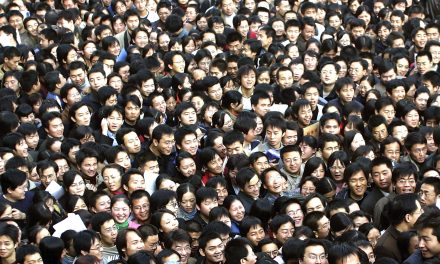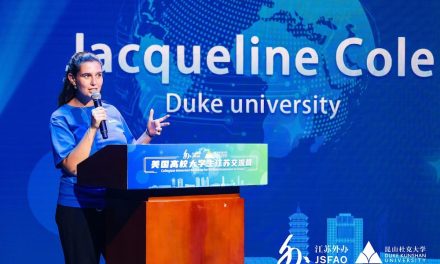By JIANLI YANG
 President Joe Biden on May 26 ordered his national security staff to submit a report on the origins of the COVID-19 pandemic. His team had 90 days to review the virus’s origins, before submitting a report this week. This deadline has been so overshadowed by the crisis in Afghanistan that few have paid attention to it. But Beijing certainly has.
President Joe Biden on May 26 ordered his national security staff to submit a report on the origins of the COVID-19 pandemic. His team had 90 days to review the virus’s origins, before submitting a report this week. This deadline has been so overshadowed by the crisis in Afghanistan that few have paid attention to it. But Beijing certainly has.
“What the U.S. cares about is not facts, but how to consume and malign China,” said Chinese Ministry of Foreign Affairs spokesman Zhao Lijian on August 18. “The international community…is sparing no effort to smear China by all means. Is it trying to deflect people’s attention from the questionable points and spotty track records of the bio labs at Fort Detrick? What is the U.S. trying to hide?”
Zhao Lijian, one of China’s brashest defenders, demonstrated once again that Beijing’s “wolf warrior diplomacy” remains fully mobilized, despite Xi Jinping’s June instruction to try to “control the tone, be open and confident as well as modest and humble, and strive to build a credible, lovable, and respectable image of China.”
It is not that Xi Jinping isn’t powerful enough to rein in wolf warriors like Zhao—in fact, those warriors happen to fit perfectly with Xi’s true strategy. The newly discovered nationalist confidence and professional posturing of Chinese diplomats was originally orchestrated by “Xi Jinping Thought on Diplomacy,” a doctrine which borrows from the first generation of Chinese communist revolution leaders.
In an article published in American Purpose, foreign policy researcher Connor Fiddler identifies seasoned revolutionary Zhou Enlai as “the progenitor of today’s wolf warriors.” Fiddler describes how Zhou (whom Mao Zedong selected to head the new regime’s Ministry of Foreign Affairs in 1949) coined the new mantra of diplomacy for the People’s Liberation Army: “the PLA in civilian clothing.” At the first gathering of new recruits, Zhou reportedly outlined the ethos of the CCP’s enterprise and declared that foreign affairs cadres are akin to soldiers. Changing the struggle from a military one to a diplomatic one was the mission Zhou gave to the new diplomats—who were mostly peasants, college students and former PLA generals. Zhou’s mantra has been followed by Chinese diplomats for generations.
To be sure, China’s rapid economic growth, emerging world-class military and increasing role as an international power have enabled Chinese leaders over recent years to speak with increased confidence.Under Xi’s leadership, diplomats have come under intense pressure to be more assertive and aggressive. Xi is popular domestically for his fiery speeches and uncompromising views on patriotism. He wants Chinese diplomats to convey this strength abroad to seek validation and recognition from other countries. In his mind, that is what a great power’s diplomatic efforts look like. When other countries withhold such validation—or, worse, criticize Chinese policies—Xi expects the Ministry of Foreign Affairs to resolutely defend China.
It is obvious that Xi Jinping’s popularity at home is intrinsically tied to the rise of nationalism in China. Wolf-warrior diplomacy will continue to earn him laurels at the domestic level, even though it has given China a bad name internationally. The CCP-run tabloid Global Times conducted a survey in which more than 70 percent of respondents stated that “wolf warrior diplomacy” is the correct diplomatic stance for China. And more than 40 million Chinese netizens have signed an open letter, launched by the Global Times last month, demanding that the World Health Organization (WHO) investigate whether Sars-CoV-2 (the virus that causes COVID-19) originated in the Fort Detrick biolab in Maryland.
Zhao Lijian’s remarks were aimed at hyper-nationalistic sentiment within China, as opposed to the international community, which the diplomat knew would not buy into his rhetoric anyway. Chinese websites are filled with disinformation about Fort Detrick and other American research entities, including accusations that the U.S. produced Sars-CoV-2 and that the U.S. has politicized international efforts to trace the pandemic’s origins.
It all appears to be part of the CCP’s campaign to bury accusations of its own complicity in the pandemic. In fact, it was in February 2020, when Beijing initiated its disinformation campaign about the origins of COVID-19, that the term “wolf warrior diplomacy” was coined.
In the early days of the SARS-CoV-2 outbreak, the CCP suppressed information about infections, hampering efforts to raise the alarm about the new coronavirus. Since then, many countries have expressed frustration that the results of the WHO’s investigation into the origins of the SARS-CoV-2 virus has been severely delayed. The Chinese government has consistently rejected proposals from the WHO and other international institutions to step up their probe into this critical issue. Meanwhile, China’s wolf warrior diplomats, under the watchful eye of Xi Jinping, are engaging in a pre-emptive disinformation campaign to help thwart international efforts to hold China accountable.
President Biden’s national security team has submitted their report to the White House, but as of this writing its results are not yet public. We will soon see how the investigators answered the critically important questions surrounding the origins of COVID-19, which has claimed millions of lives and continues to wreak havoc around the world. Everybody knows how vital it is for people to understand the role that China played in causing and prolonging the pandemic.
Back in September 2005, when politicians, economists and other international observers were scrambling to make sense of the possibility of China’s rise, then-deputy secretary of state Robert Zoellick put forth a theory of China as a “responsible stakeholder.” More than 15 years later, China has yet to become a responsible stakeholder. Instead, it has become the wolf lurking in everyone’s yard.
Jianli Yang is founder and president of Citizen Power Initiatives for China and the author of For Us, the Living: A Journey to Shine the Light on Truth.
This article first appeared in Newsweek on 8/26/21






















